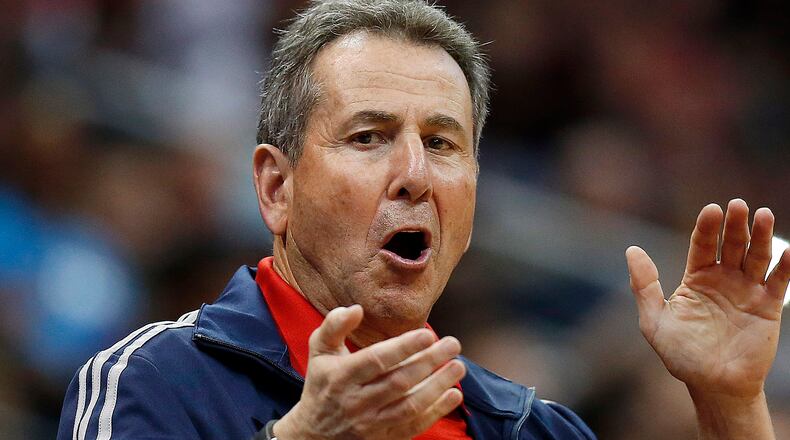Once again, we’re hearing calls for an “honest dialogue” on race, this time spurred by the events in Ferguson, Mo.
So along comes Atlanta Hawks’ owner Bruce Levenson, writing honestly about the team’s failure to sell tickets to suburban white guys, which he attributed in part to their perception that the crowds, the cheerleaders and the music are too black. That memo shined a light into the darkness in many white people’s souls, and, well, the resulting dialogue has not been exactly uplifting.
“My theory is that the black crowd scared away the whites and there are simply not enough affluent black fans to build a significant season ticket base,” Levenson wrote in the two-year-old email.
His theory has some truth on both ends – lots of whites do have a fear of black people, and it is hard to build a thriving business by depending on one race or ethnic group.
Levenson was being honest as he saw it (although certainly stupid in putting it in an email). He was looking at the world in a thoughtless, rich-white-guy way because he’s a thoughtless, rich white guy, although probably well meaning. But those were his feelings, and he wrote them, and now he’s on his way out, citing his own “inappropriate and offensive”remarks.
The opportunity to say stupid things is as American as cherry pie, to paraphrase H. Rap Brown. Just don’t be too open or too public about your true feelings when it comes to race, because the more honest you are, the more chance there is of being burned. There is really little upside.
For the past 20 years, all sorts of leaders, from Bill Clinton, to Barack Obama, to former Atlanta Mayor Bill Campbell, to Georgia’s first Republican governor, Sonny Perdue, and most recently, the People’s Republic of Decatur, have launched or tried to kick off honest racial dialogues. The outcome? Well, we know that answer.
Last year, I was charged with helping find folks to sit on a panel to talk openly and honestly about race. The U.S. Supreme Court had knocked down a key part of the Voting Rights Act, and some of the newspaper’s editors thought it might make for an interesting discussion.
But in the hours leading up to that round table I got panicked calls from the editor who was wrangling the panel: A couple of the paler faces I recruited had backed out. It was like I was asking them to sit in a dunk tank filled with scalding water. And, in fact, I kind of was.
Finally, a friend, Anne Lewis, who is also the state Republican Party’s lawyer, was courageous and took one for the team, agreeing to sit in. I didn’t attend the discussion but I’m sure Anne, who is kind and thoughtful and very smart, didn’t say anything stupid.
But there’s always the worry you will, especially when it comes to us white folk. Recently, I commented on Facebook concerning a news story that said numerous cities across the U.S. have large gaps between the percentage of black residents and black police officers.
“There’s many reasons to this other than the initial ‘that’s bias,’” I opined. “Many large metro depts have tried hard to find qualified black recruits.”
“Yes, I often hear media managers say the same,” a black colleague responded.
“I cringe when I hear people say ‘qualified’ and ‘black’ in the same sentence,” another wrote, adding that many white cops get hired because of family connections or cronyism.
I had two choices: continue the discussion, or zip it. I chose the latter.
We all harbor biases, preconceptions and frustrations. Psychobabble says we should openly talk through our inner feelings to get through to an understanding and even inner peace.
But during these bursts of “honesty” we usually remain within safe zones, saying things that we figure polite society wants to hear. I must point out I’m referring to public statements, or comments in mixed racial company. I’m not referring to people who choose to post anonymously on Internet, because they are often cowards, bullies and nincompoops.
Whites reflexively argue that most violence against blacks is committed by other blacks, not whites, or that the more than 70 percent of black children are born out of wedlock. But then there are counter-arguments, about an endemic lack of educational or economic opportunity for young black men, about drug law enforcement being racially out of whack, about white flight still not being a thing of the past.
In full disclosure, I must say that I, too, am guilty of issuing calls for racial dialogue. In 1992, I wrote an opinion piece headlined, “Only honest discussion can cut through the bias.”
I wrote the column after being punched in the face at a Martin Luther King Day parade and after shooing off a black man who was asking me for money. I was suffering from a White Guy Combo, competing feelings of fear and guilt.
I noted that then-Sen. Bill Bradley made an impassioned speech to the Senate, in which he said, “The more Americans are honest about the level of mistrust they hold for each other, the easier it will be to get beyond those feelings and forge a new relationship without racial overtones.”
We’re still waiting.
About the Author
Keep Reading
The Latest
Featured




